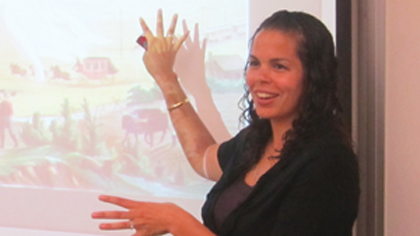archive

"Civil War Chicago: Eyewitness to History" on October 20th
Professor of History Theodore J. Karamanski, PhD and Loyola alumna Eileen M. McMahon, PhD, will discuss their new book on the Civil War’s transformative role in Chicago's development.

Richard Pryor Biographer to Speak at Loyola
Scott Saul, the author of Becoming Richard Pryor, will give a public lecture on the comedian entitled "Living with Richard Pryor: A Biographer's Tale" on Friday, April 24 at 3 PM.
Timothy Gilfoyle on "The Changing Forms of History"
Should history be a book discipline? What constitutes "acceptable scholarship" in history? Professor Timothy Gilfoyle considers the rich and diverse forms that historical scholarship take from books, digital media, and public history projects in his article "The Changing Forms of History" in April's edition of Perspectives on History, the AHA newsmagazine.

"The Rise of the Nation-Saint" on November 5th
Prof. Kathleen Sprows Cummings, University of Notre Dame, discusses a pre-circulated paper on the efforts of U.S. Catholics to secure their first canonized saint for the third meeting of the 2015-2016 Ramonat Seminar Series.

Voices of Chicago Women Activists
Celebrate Women's History Month with the Women & Leadership Archives and the Chicago Area Women's History Council. Come hear multimedia excerpts of oral histories by Columbia College honors students featuring Chicago women activists and leaders. The event will be held on Sunday, March 16th from 2:00pm-5:00pm on the 1st floor of Piper Hall.

What was Chrysler Village and how did it get its name?
Public History graduate students know and shared their work on a historic nomination for the neighborhood with Ask Geoffrey on WTTW the other night.
LEARN MORE
Closing the Gap
Sarah Doherty (PhD '12) reflects on the importance of the Preparing Future Faculty Program in equipping her, and other minority doctoral students, with the skills necessary for a career in academia.
LEARN MOREGraduate Student Dan Ott wins 2012 Everett E. Edwards Award

Graduate Student Dan Ott has won the 2012 Everett E. Edwards Award from the Agricultural History Society. The Edwards Award is presented annually for the best article submitted to the Society's journal, Agricultural History, by a graduate student.
Ott's paper, “Producing a Past: McCormick Harvester and Producer Populists in the 1890s", comes out of work that he has undertaken in his graduate seminars in the History Department. It focuses on the McCormick Harvesting Machine Company’s advertising during the 1880s and 1890s as the company attempted to assuage producer antagonism and fend off industrial competitors. The center of their advertising and brand was the “fact” that Cyrus McCormick Sr. invented the mechanized reaper in 1831. They used this historical fiction to align their company’s inventive labor with the manual labor of their producer customers who were a significant portion of the radical agrarian movement during the period. McCormick Harvester also utilized that position to claim that they had provided farmers with the tools of civilization that allowed them to produce at greater levels and become modern consumers. Through this strategy, they also implied that all other harvester manufacturers were child-like followers upon the trail created by McCormick’s inventive genius. This marketing strategy was met with incredible resistance from their competitors, like Deering Harvester, as they waged a campaign to refute the McCormick past in the public sphere. Their ultimate success undermined the McCormick brand and market share, forcing the firm that “fathered the reaper” to seek industrial consolidation - resulting in the creation of International Harvester in 1902.
The Edwards Award will be presented to Ott at the 2013 Annual Meeting in Banff, Alberta.
